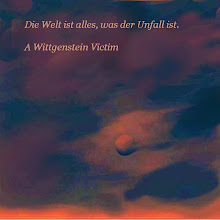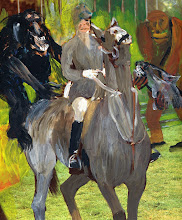Joseph Roth’s literature comes from the East, from the border of a great empire where miracles and storytellers belong to the everyday world. He was a “Badchan”, the eastern Jewish combination of joker, fool, philosopher and storyteller. But he was also a realist in the sense of Balzac and “Thousand and One Nights” for whom the detail is not a symbol, but rather itself the concrete totality.
In a short tribute to a fellow “Kolporteur”, Egon Erwin Kisch, Roth expresses the intention of his own poetics: “Egon Erwin Kisch is not a roving reporter; that is only a nickname, that he gave himself not without self-irony; he is a conscientious and profound journalist. What makes him a superb writer and his reportage – a literary oeuvre, is – the materialist Kisch will hopefully forgive me – the grace, the grace of the true writer, which consists in a way of describing reality, without injuring the truth; that despite the documentary reality one does not neglect the truth.” (Joseph Roth, Prague, 1934)
(“Egon Erwin Kisch ist kein rasender Reporter; das ist ein Spitzname, den er sich nicht ohne Selbstironie gegeben hat; er ist ein gewissenhafter und gründlicher Berichterstatter. Was ihn aber zum vorzüglichen Schriftsteller macht und seine Berichterstattungen zu literarischen Werken, ist – der Materialist Kisch möge es mir nachsehen - die Gnade, die Gnade des echten Schriftstellers, die darin besteht, daß man die Wirklichkeit beschreibt, ohne die Wahrheit zu verletzen; daß man trotz der dokumentarischen Wirklichkeit nicht versäumt, die Wahrheit zu sagen.” Joseph Roth Werke, Band IV, Amsterdam, 1975, p. 286)
One hears a Hegelian phenomenology in this brief credo – the truth is real, reality is not necessarily the truth. Roth’s narrative truth does not however lie in an exemplification of a philosophy of history. Rather it is below – the subversive unwritten manuscripts of “stillen Dichter” (silent poets) – in the shabby world of the eastern Jewish small town (Shtetl) and its saving Chassidic graces. His wisdom resides in the secret knowledge of the powerless, of the slaves, that behind every mask of power are the grimaces of Job. “Also you are Job”, whispered the old man called “Heiliger Vater” (Holy Father) to Napoleon after Waterloo in Roth’s “Die Hundert Tage” (The Hundred Days). The recognition of forms of misfortune is a privilege of the weak. This tale appears from its other end in Ernst Bloch’s “Spuren”. Bloch quotes an eastern Jewish story meant as a joke, only because its earnestness belies an uncanny vertigo in the seamless plane.
The story entitled “Fall ins Jetzt” (Fall in Now) in “Spuren” goes as follows:
Some Jews were conversing in a prayer house in a small town. They were discussing what each one would wish if an angel were to appear. The rabbi said he would wish to be rid of his cough. I wish I would marry off my daughter, said the second. A third wished he did not have a daughter, but rather a son who could take over his business. Finally the rabbi turned to a beggar sitting on the bench in the back and asked what his desire was – for certainly he did not look like he was without a wish. The beggar’s wish takes the form of an imaginary chronicle leading up to the present. I wish, said he, I were a great king like King Solomon but without his luck in war. My armies are defeated, my cities and forests are set on fire, the enemy is at the gates of my palace with its onyx, marble and sandalwood. I am alone in the throne room with sceptre and crown, deserted by my court and nobles, I hear the people in the streets crying out for my blood. I must flee the enemies invading my land with nothing but the shirt on my back, I cross the border and mingle among people who do not know me and am saved, “(…) und seit gestern abend sitze ich hier.” (“and since yesterday evening I am sitting here”, Ernst Bloch, Spuren, Frankfurt, 1983, p. 99) The rabbi is perturbed by this wish in which again the beggar loses everything. The beggar interjects – I would have something, the shirt on my back.
Bloch emphasizes the interaction of a dream past and the present – the convolutions introduced by the wish-form as a historical conjecture with an ending in the ‘real’ present. This is however the essence of the storyteller, the epic ballad – the fictive past is transformed by its telling in the present. The present harbours all possible pasts as its story, not unlike the intervention of the dream in reality. As de Nerval says: “Le rêve est une seconde vie.” Cervantes placed both dream and reality in the present. The dream images of Don Quixote do not make him ridiculous – his dreams derisively reveal the material squalor of the world through which Don Quixote rides blinded by dreams. The blindness to a ‘documentary reality’ enables the vision of another reality. The supposed insanity of the hero of Gustav Meyrink’s “The Golem”, his sensual perception of “Grauen” (horror), is expressive of the ghetto’s most tangible form – the room without the door.
Roth, eastern Jewish K.u.K loyalist, ‘hanging on Franz Joseph’s sideburns’ (Itzik Manger) reflects another mythological truth, that of the German fairy tales. His Napoleon is the emperor of the people, chosen and crowned by them. He is the Volkskaiser, the sleeping emperor, who will awaken for the final victory to free the poor and oppressed. An erotic bond exists between the people and their redeemer. Without this belief the beggar just sits there – the present collapses into itself. He is a naked vulnerable Job without a past and therefore without a future.
Roth shared the longings for messianic redemption of eastern European Chassidism. He remained a son of the Shtetl, home of those strange figures without an address and visible occupation who people his novels and whose historical limitations he described most aptly. They were also his own. “Der arme Jude ist der konservativste Mensch unter allen Armen der Welt. Er ist geradezu eine Garantie für die Erhaltung der alten Gesellschaftsordnung.” (“The poor Jew is the most conservative person amongst all the poor of the world. He is the perfect guarantee for the preservation of the old social order.” Joseph Roth, “Juden auf Wanderschaft”, Werke, Band III, Amsterdam, 1975, p. 321) This conservatism was perhaps the greatest misfortune of the nation of Jobs. Messianic transcendentalism was only exceeded by fatalism and submissiveness in daily life. Chiliastic redemption was a local rumour, possibly true in the next town but never in one’s own.
The names of Kisch, Meyrink and Bloch manifest the perimeter of Roth’s narrative world. Like them, he charts the fluctuations of an objective cruel fate –Glück und Unglück (happiness and unhappiness, luck and unluckiness), power and powerlessness, master and slave – but always leaving a crevice for a wish or a joke or a Houdini like escape. Roth saw not only the existing and coming destruction of the world into which he was born. He was not only a beggar with just a shirt on his back. The truth of Job is also the turn of fate, a redemption which infuses the vagaries of ordinary people with cosmological design. “As long as there is still one beggar around, there will still be myth.” (“Solange es noch einen Bettler gibt, solange gibt es noch Mythos.” Walter Benjamin, Das Passagen-Werk, Frankfurt, 1983, [K 6, 4], p. 505)

















.jpg)














No comments:
Post a Comment